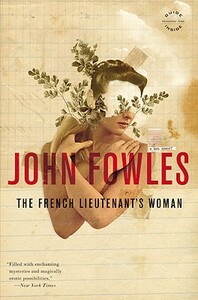Take a photo of a barcode or cover
challenging
informative
lighthearted
reflective
slow-paced
An interesting study of how Victorian era men and women regarded sex and depression. Frustrating at times and really not very provoking as far as the story goes, but the two endings you are allowed to choose from really does say a lot about you.
challenging
dark
informative
mysterious
reflective
medium-paced
Plot or Character Driven:
Character
Strong character development:
Complicated
Loveable characters:
No
Diverse cast of characters:
No
Flaws of characters a main focus:
Complicated
mysterious
reflective
slow-paced
Plot or Character Driven:
Character
Strong character development:
Yes
Loveable characters:
No
Diverse cast of characters:
No
Flaws of characters a main focus:
Yes
*I read this book for university*
I honestly had never heard of this book before. It was, therefore, rather surprising to find out that my parents have the DVD of the film adaptation! Guess what I'm going to watch now.
It was a coincidence that I read Jane Austen's Persuasion last year, but I'm glad I did, because there are quite a lot of references in this book to that novel. Actually, not just Persuasion. There are tons and tons of references to classics (Victorian novels, as well as THE Classics). Luckily, I have read/learned about a lot of the works that are referenced throughout The French Lieutenant's Woman, because I otherwise would probably not have understood a lot. John Fowles really knows how to make readers feel uneducated. Some of the people Fowles refers to are Catullus (Roman poet), Charles Darwin, Karl Marx, Thomas Hardy, Jane Austen, John Stuart Mill, etc.. He also refers a lot to Greek mythology and the Bible. Oh, and WWII. I don't understand why Fowles would make this book so hard to understand. It's probably a postmodernist thing.
The story was fun to read. I particularly enjoyed the first half. The second half was a bit of a struggle to get through, because not only did I have to kind of speed read it, the story also didn't really go anywhere (aka it was somewhat boring). While the characters were interesting to read about in the first half, they became a little annoying in the second half. Charles in particular. For such an educated person, he didn't really do many smart things. Why did you trust Sam, Charles? Why did you not visit Sarah in person?!
The narration of the story was very interesting and unlike anything I've read before. The idea of having three different endings and letting the reader decide which one is "true" was really cool. I also loved that this novel is written through a contemporary viewpoint. While the modern references such as computers and cinemas might feel jarring, it was a refreshing feature to see. The modern topics Fowles discusses are unusual in Victorian literature, so it was fun seeing them discussed in that time setting.
I particularly recommend The French Lieutenant's Woman if you want to read something that is set in the Victorian Era, but isn't actually Victorian/discusses "modern" topics (keep in mind that this novel is from 1969). A thing to note about this story is that there are many references to (the) classics, so if you don't know anything about them, expect a lot of Googling.
I honestly had never heard of this book before. It was, therefore, rather surprising to find out that my parents have the DVD of the film adaptation! Guess what I'm going to watch now.
It was a coincidence that I read Jane Austen's Persuasion last year, but I'm glad I did, because there are quite a lot of references in this book to that novel. Actually, not just Persuasion. There are tons and tons of references to classics (Victorian novels, as well as THE Classics). Luckily, I have read/learned about a lot of the works that are referenced throughout The French Lieutenant's Woman, because I otherwise would probably not have understood a lot. John Fowles really knows how to make readers feel uneducated. Some of the people Fowles refers to are Catullus (Roman poet), Charles Darwin, Karl Marx, Thomas Hardy, Jane Austen, John Stuart Mill, etc.. He also refers a lot to Greek mythology and the Bible. Oh, and WWII. I don't understand why Fowles would make this book so hard to understand. It's probably a postmodernist thing.
The story was fun to read. I particularly enjoyed the first half. The second half was a bit of a struggle to get through, because not only did I have to kind of speed read it, the story also didn't really go anywhere (aka it was somewhat boring). While the characters were interesting to read about in the first half, they became a little annoying in the second half. Charles in particular. For such an educated person, he didn't really do many smart things. Why did you trust Sam, Charles? Why did you not visit Sarah in person?!
The narration of the story was very interesting and unlike anything I've read before. The idea of having three different endings and letting the reader decide which one is "true" was really cool. I also loved that this novel is written through a contemporary viewpoint. While the modern references such as computers and cinemas might feel jarring, it was a refreshing feature to see. The modern topics Fowles discusses are unusual in Victorian literature, so it was fun seeing them discussed in that time setting.
I particularly recommend The French Lieutenant's Woman if you want to read something that is set in the Victorian Era, but isn't actually Victorian/discusses "modern" topics (keep in mind that this novel is from 1969). A thing to note about this story is that there are many references to (the) classics, so if you don't know anything about them, expect a lot of Googling.
Other thoughts/reviews:
Books and Chocolate: http://karensbooksandchocolate.blogspot.be/2012/07/french-lieutenants-woman-by-john-fowles.html
Reading, Writing, Working, Playing: http://janegs.blogspot.be/2016/03/the-french-lieutenants-woman.html
Booklover (in Dutch): https://boeklover.wordpress.com/2015/12/13/the-french-lieutenants-woman-john-fowles/
Books and Chocolate: http://karensbooksandchocolate.blogspot.be/2012/07/french-lieutenants-woman-by-john-fowles.html
Reading, Writing, Working, Playing: http://janegs.blogspot.be/2016/03/the-french-lieutenants-woman.html
Booklover (in Dutch): https://boeklover.wordpress.com/2015/12/13/the-french-lieutenants-woman-john-fowles/
challenging
dark
mysterious
reflective
medium-paced
Plot or Character Driven:
A mix
Strong character development:
Complicated
Loveable characters:
No
Diverse cast of characters:
No
Flaws of characters a main focus:
Yes
Interesting narrative mode is the redeeming quality of this traditional/Neo-Victorian storyline. Climax of the novel falls quite flat despite beautiful descriptions of settings.
This book was both admirable and frustrating. It never seemed to end (and that is only in part because it actually has three endings). Part Victorian melodrama, part sociological study; I felt like the author was looking at the characters from under a microscope. Occasionally he takes time to lecture on the specimens all the while reminding the reader that it just fiction and deliberates if it is he or the reader who is the post-modern deity who determines the story. The story has three main characters: Charles is a quintessential Victorian aristocratic dilettante, duty dictates his every move; Ernestina is his wealthy but vapid fiancée whose dowry is tainted by that dirty word, “Trade”; and Sarah is a mentally unbalanced (or forward thinking suffragette, you choose) young woman reveling in her disgrace and the tizzy fits this causes her uptight employer, who takes her on as a charity case. I read this for the Cornflower Book Group April 2012 selection and it is an excellent pick, because this sort of book is ripe for discussion.
Although some people see this book as pretentious I thoroughly enjoyed all the allusions (although not understanding many-which made me research the reference something which I personally love to do when reading) and Fowles' manipulation of the plot! The characters are very complex and sometimes I have to admit I was a little lost (i.e. the endings) but the ideas discussed in this novel were extremely entertaining whilst thought provoking.
rly boring at times, but still rly original and with a cool af narrator




